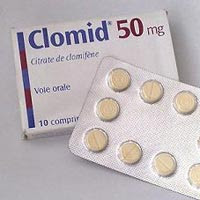Clomid Information
Clomid is an ovulatory stimulating drug used to help women whohave problems with ovulation. It is the most commonly used and best well-known fertility drug. Because Clomid can be prescribed by a gynecologist, and doesn't require a fertility specialist, it's also the very first fertility treatment tried for most couples.
Clomid is taken as a pill. This is unlike the stronger fertility drugs, which require injection. Clomid is also very effective, stimulating ovulation 80% of the time.
Clomid may also be marketed under the name Serophene, or you may see it sold under its generic name, clomiphene citrate.
Note: Clomid can also be used as a treatment for male infertility. This article focuses on Clomid treatment in women.Clomid is a drug with a generic name of Clomiphene. Clomid is an agent for stimulating ovulation.
Clomid Indications
Clomid is indicated for patients with hormonal stimulation deficiencies who are not capable of producing follicles and releasing eggs in ovulation. Clomid stimulates the release of hormones to aid a woman to ovulate.
Clomid may also be used for other purposes aside from the ones mentioned here.
Clomid Warnings
Clomid can cause disturbed vision and blurred vision and therefore should be used with caution when driving, operating machinery or performing tasks that require visual alertness.
For those women who are planning to get pregnant, be warned that taking Clomid may result to multiple births and this may be harmful to the mother and to the fetus as well.
Clomid may also be not advised for patients with the following medical conditions:
- Endocrinal disorders
- Thyroid problems
- Live diseases
- Ovarian cysts and enlargement
- Polycystic ovarian syndrome
- Uterine fibroids
- Any other chronic illnesses
- Endometrical carcinoma
- Vaginal bleeding
If you have any of the above-mentioned diseases, your doctor may advise you not to take Clomid or will significantly alter your dosage.
Clomid is also not advised for pregnant women as it is a drug in the pregnancy category X and may cause birth defects when taken by pregnant women.
Clomid is also not advisable for nursing mothers as it passes into the breast milk and may cause harm to the nursing infant.
Clomid Intake Guidelines
Clomid should be taken exactly as prescribed by your doctor. Never attempt to deviate from your doctor’s instructions regarding the mode of intake.
Each dose of Clomid must be taken with a full glass of water of about to 6-8 ounces.
Clomid is mostly taken at 5 day cycles and you should follow your doctor’s instructions on the frequency and interval of each dose.
Clomid Dosage
Your doctor is the only one that can effectively determine the dosage of Clomid. Always follow your doctor’s instructions on the exact dose of Clomid.
Clomid Overdose
Overdose of Clomid can be characterized by:
If overdoseof Clomid is suspected and these signs are present, hasten to seek emergency medical attention immediately.
Allergic Reactions is likely to occur on susceptible patients. Allergic reactions are manifested by the following symptoms:
Other side effects also include:
Ovarian hyperstimulation syndrome (OHSS) characterized by abdominal pain, swelling of limbs, weight gain, nausea and shortness of breath. OHSS can become fatal and if it is suspected, notify your doctor immediately.
Other side effects may also be likely to occur and you should inform your doctor on what to do when they become intolerable or bothersome.
Buy Clomid
Clomid should be taken exactly as prescribed by your doctor. Never attempt to deviate from your doctor’s instructions regarding the mode of intake.
Each dose of Clomid must be taken with a full glass of water of about to 6-8 ounces.
Clomid is mostly taken at 5 day cycles and you should follow your doctor’s instructions on the frequency and interval of each dose.
Clomid Dosage
Your doctor is the only one that can effectively determine the dosage of Clomid. Always follow your doctor’s instructions on the exact dose of Clomid.
Clomid Overdose
Overdose of Clomid can be characterized by:
- Nausea
- Hot flushes
- Visual spots
- Blurred vision
- Vomiting
- Abdominal pains
If overdoseof Clomid is suspected and these signs are present, hasten to seek emergency medical attention immediately.
Clomid Side Effects
Allergic Reactions is likely to occur on susceptible patients. Allergic reactions are manifested by the following symptoms:
- Hives
- Swelling of lips, mouth and tongue
- Rashes
- Closing of throat
Other side effects also include:
Ovarian hyperstimulation syndrome (OHSS) characterized by abdominal pain, swelling of limbs, weight gain, nausea and shortness of breath. OHSS can become fatal and if it is suspected, notify your doctor immediately.
- Blurred vision
- Headache
- Abnormal uterine bleeding
- Breast discomfort and tenderness
- Pelvic pain
- Swelling of pelvic area
Other side effects may also be likely to occur and you should inform your doctor on what to do when they become intolerable or bothersome.
Buy Clomid


No comments:
Post a Comment